
Does Bong Water Filter Out THC?
Stoners may awake in a cold sweat, wondering if their weed was rendered impotent by the THC-trapping qualities of the bong water. They reach for their bong to quell that fear, but wonder, are you working against me? Read on to find out why this fear is unfounded, how to work out exactly how much THC is being robbed, and sleep well!
Bong water serves a great purpose, though it can be quite disgusting to smell or look at if we don't refresh it often. But what would we do without it? Its simple cooling and filtering properties have saved many stoner throats. But what does it filter out? And, more importantly, does it remove any precious THC or terpenes from your hits? The answer is a little convoluted. So, join us as we go into detail on precisely what happens when your favourite cannabis compounds in gas form come into contact with water, and whether this ultimately reduces the overall potency of your hit.
Why do we put water in a bong?
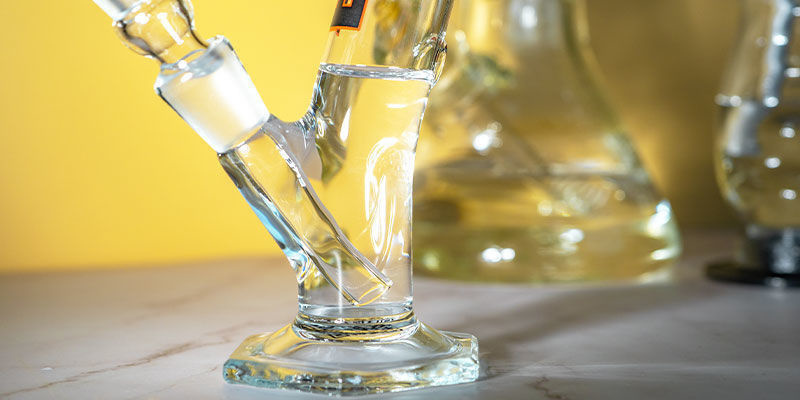
First, what's the point of even putting water in a bong? Essentially, the water serves to create a cleaner, smoother smoke. It achieves this in a twofold manner. Primarily, by passing through the cool water, the temperature of the smoke is lowered significantly, resulting in a less harsh pull. The water also acts to trap soluble compounds in the smoke (and, as it turns out, some insoluble ones too). This also filters the smoke, again making for a much cleaner hit.
Does bong water filter out THC?
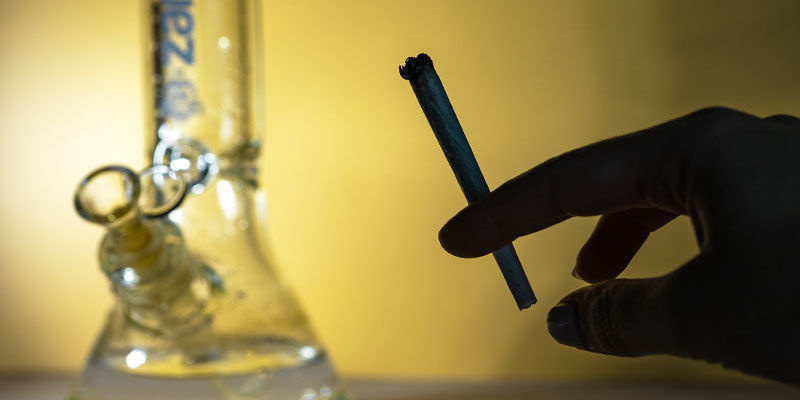
So, while we know that the function of water in a bong is to make the overall smoking experience smoother, does it end up filtering out THC as well? Technically, yes. Practically, no. With such a large body of water, it does end up trapping a very small amount of insoluble THC. However, this won't really impact your high. What's more, it's actually a far more efficient way of smoking weed when compared to a spliff/joint, where much more is lost as it burns.
Does bong water filter toxins?
So, we know that the water in a bong removes some soluble compounds, but how does it fare with toxins? Bong water does, in fact, have the potential to remove some unwanted toxins from the smoke too, albeit not in massive amounts—certainly not enough to consider it healthier than any other method of inhaling smoke. As always, if you're concerned about the effects of smoke, it might be best to find another method of consumption.
However, bong water also traps larger particles, such as ash and plant matter. These particles cause particular irritation to the throat and lungs, as they are large and very hot. So by removing them, you're doing yourself a massive favour.
Does bong water filter out terpenes?
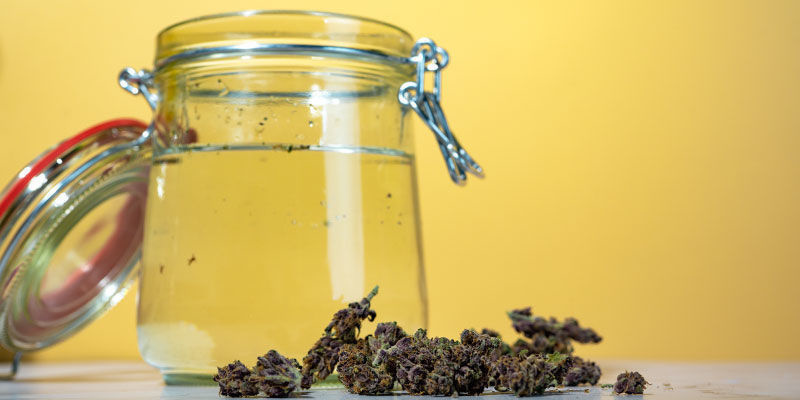
Similar to THC, plenty of stoners want to know if the flavour and aroma of their weed (which come courtesy of terpenes) are impeded by the presence of water. Bong water does have the potential to filter out terpenes, but the amount is negligible when compared to the filtration of toxins and particles.
However, you certainly don't have to look far online to see anecdotal reports of users claiming that their pulls are less flavourful when using a bong. But there are too many factors to consider, such as the quality of the weed and cleanliness of the bong to begin with, to reach a general consensus.
Can you calculate how much THC is filtered out by bong water?
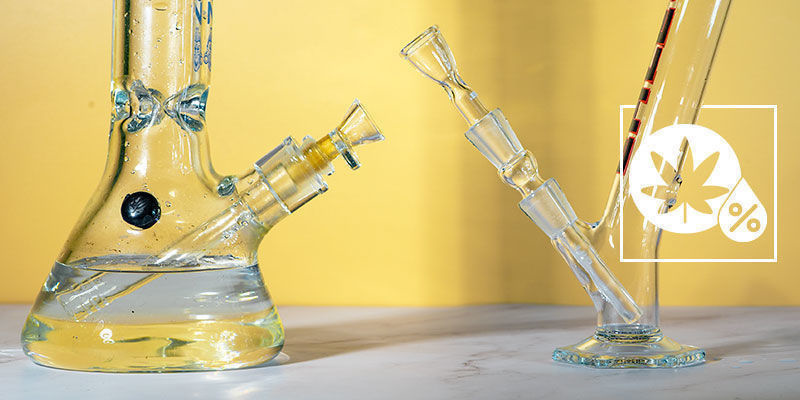
Let's try out some fun maths: if you’re looking to determine exactly how much THC is lost when smoking a bong, there are several variables to consider. The first is the THC content of the weed itself. So, if it's 10%, there is 100mg of THC per gram of weed. This is pretty simple maths. The second, then, is how much weed we are putting in the bowl. Percentages stay the same, so just work out 10% (or whatever your potency is) of your given weight. For this example we'll be using 3g of 10% weed.
We also need to know how many millilitres of water there are in the chamber of the bong; this is important, as THC has a maximum water solubility of around 2.8mg per litre of water at a temperature of 23°C. So, if you had 500ml of water in your bong, it would trap 1.4mg of THC, which means you'd be inhaling 298.6mg of THC.
Or would you? THC, like many compounds, becomes less soluble as temperature increases. So while these figures are given at 23°C, a bong hit is likely to sit around 100°C, and thus the solubility will be significantly less. At 23°C, THC will be in a solid form. At 100°C, inside the big bubbles of air going through your bong water, it will be a gas. Gases are less soluble than solids. Henry's law states that as the temperature in gas increases, solubility decreases.
Not only does temperature play a considerable role, but the atmosphere does too. No, we're not talking about ambience and setting. As we're inhaling, we are reducing the atmospheric pressure within the bong chamber. Let's say it drops to around 80% of normal atmospheric pressure. Due to the lower pressure and the universe's desire for equilibrium, even less THC will be trapped in the water. However, THC particles can stick together in the water and then coat the glass of the bong at the water level, resulting in a visible mark within the bong.
As you can tell, there are many factors at play here, so it's not just as simple as lighting the bowl and seeing what happens, or is it?
Is bong water good for anything?
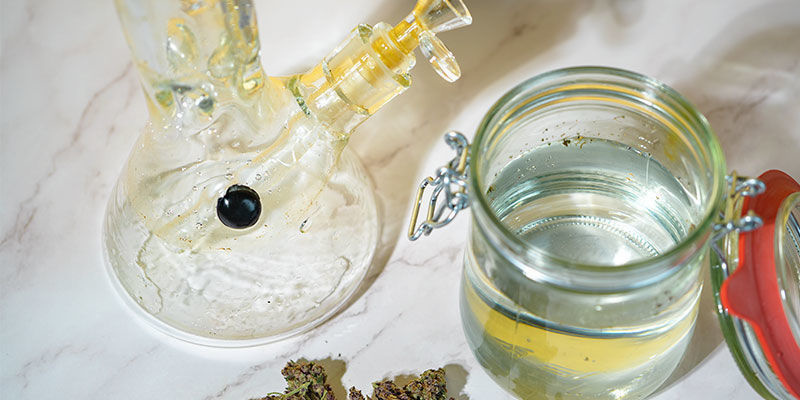
While the science behind bong water's efficacy at filtering out THC greatly favours stoners, very few trials or actual studies have been conducted, meaning our take is theory-based but well-founded. Of course, it is probably safe to assume that less than 1% of your THC will be lost to your bong water, possibly even less, considering that most bongs house less than a litre of water. In other words, if we take our earlier example, you'll still be getting around 297mg out of 300mg of your beloved THC, if the full 1% is lost.
Despite the minor THC filtration, bong water has numerous benefits. It's true that it has the potential to offer a much more flavourful pull, thanks to the water cooling the smoke. A smoother and cooler pull will no doubt feel better when compared to the harsh smoke created by other methods, such as pipes and joints.
In short, the filtration of THC is unlikely to wreck your high. When you consider the alternative of hitting a bong without water, you'll probably decide that this very minor sacrifice is well worth it. Just be sure to change the water and keep your bong clean, and you can't go wrong!
- (n.d.). Physicochemical Properties, Solubility, and Protein Binding of Δ9 -Tetrahydrocannabinol - https://jpharmsci.org
- Contributors to Wikimedia projects. (2003-06-01T05:44:25Z). Henry's law - Wikipedia - https://en.wikipedia.org
-
 6 min
5 September 2023
How To Use A Bong
Bongs might look threatening, but they're actually fairly easy to master (if you can get past the coughing). Learn all about how to use a bong here!
6 min
5 September 2023
How To Use A Bong
Bongs might look threatening, but they're actually fairly easy to master (if you can get past the coughing). Learn all about how to use a bong here!
-
 5 min
2 December 2021
What Are The Benefits Of Using A Bong?
If you're reading this, you're likely one of the many herb-loving individuals who stands steadfast by their bong. Lucky for you, this smoking method has many benefits, ranging from the functional...
5 min
2 December 2021
What Are The Benefits Of Using A Bong?
If you're reading this, you're likely one of the many herb-loving individuals who stands steadfast by their bong. Lucky for you, this smoking method has many benefits, ranging from the functional...
-
 6 min
21 October 2021
Top 10 Best Glass And Plastic Bongs
Looking for a good bong? We can help! Here is our list of the 10 best glass bongs and plastic bongs for every stoner's taste and budget!
6 min
21 October 2021
Top 10 Best Glass And Plastic Bongs
Looking for a good bong? We can help! Here is our list of the 10 best glass bongs and plastic bongs for every stoner's taste and budget!
-
 6 min
2 May 2021
What Is An Ice Bong?
In the world of bongs, there is an incredible assortment of high-tech, expensive, and sometimes over-the-top solutions to a simple problem: ripping bongs can hurt! But, as we all know, often the...
6 min
2 May 2021
What Is An Ice Bong?
In the world of bongs, there is an incredible assortment of high-tech, expensive, and sometimes over-the-top solutions to a simple problem: ripping bongs can hurt! But, as we all know, often the...













 United States
United States










